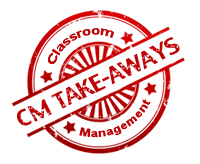
Even the best-run classrooms experience problem behavior. Some teachers face behavior problems in the classroom often; such problems may even be a daily routine that reflects the prevalent disrespect that has corroded our schools. For others, student disruptions are rare. Regardless of their frequency, we know inappropriate behavior is bound to happen. Preventing misbehavior is crucial to classroom management. The more proactive teachers are, the less likely they are to encounter problem behavior.
When challenging behavior does occur, teachers must handle such challenges in a professional, mutually respectful way that still holds students accountable and minimizes disruptions to learning. That’s a tall order, but you can achieve it in all but the most extreme circumstances by using the reactive strategies we teach.
A proper response to misbehavior begins immediately. Teachers must commit to first evaluating the the potential the behavior has to interfere with student learning and then by responding appropriately. Conflict is inevitable – but combat is optional. With prompt attention to emergent misbehavior, teachers can eliminate as much as 90% of minor, pesky behavior problems from the classroom.
Our Beliefs About Classroom Management
- Times have changed.
- Teachers do an incredible job.
- “Kids don’t care how much you know until they know how much you care.” Dr. Madeline Hunter
- Good discipline is a matter of good timing.
- Conflict is an essential part of growing up.
- Parenting affects behavior.
- We cannot use poor parenting as an excuse for not teaching.
- Problem behavior can entrap us.
- Curriculum comes first, but discipline does, too!
- Self-esteem matters.
- We cannot assume that students know how to behave.
- Classroom rules and routines must be systematically taught.
- Teaching succeeds where punishment fails.
- We need effective consequences for low-level misbehavior.
- An effective discipline program teaches responsible behavior.
- We can make a difference to every child.

